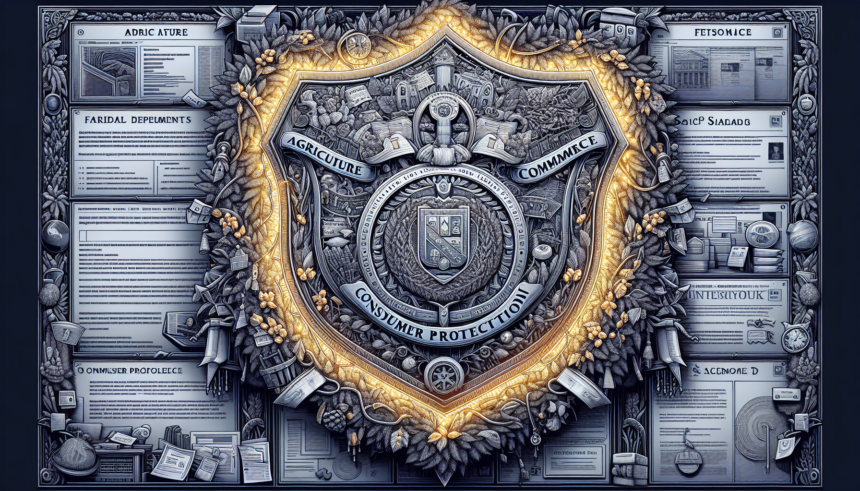Main Points In Hindi (मुख्य बातें – हिंदी में)
-
उपहारों के लिए सतर्कता: सर्दियों की छुट्टियों के दौरान उपभोक्ताओं को घोटालेबाजों से सावधान रहने की सलाह दी जा रही है, जो उपहार खरीदने और देने के दौरान उनके अच्छे इरादों का फायदा उठाने की कोशिश कर रहे हैं।
-
पैकेज डिलिवरी घोटाले: उपभोक्ताओं को असफल पैकेज डिलीवरी के झूठे टेक्स्ट और ईमेल संदेशों से सावधान रहना चाहिए, जिनमें लिंक पर क्लिक करने से धोखाधड़ी वाली वेबसाइट पर पहुंचने का खतरा होता है। सुरक्षित रहने के लिए, उपभोक्ताओं को सीधे डिलीवरी कंपनी की वेबसाइट पर जाकर स्टेटस चेक करना चाहिए।
-
ऑनलाइन बाज़ार घोटाले: ओनलाइन मार्केटप्लेस जैसे क्रेगलिस्ट और ईबे पर खरीदारी करते समय, उपयोगकर्ताओं को अग्रिम भुगतान के लिए कहने वाले विक्रेताओं से सजग रहने की चेतावनी दी गई है। बातचीत को उसी प्लेटफॉर्म पर रखना और सुरक्षा कोड साझा न करना महत्वपूर्ण है।
-
फर्जी वेबसाइट घोटाले: उपभोक्ताओं को ऐसे नकली रिटेलर साइटों से सतर्क रहने की सलाह दी गई है, जो धोखाधड़ी के लिए बनाई गई हैं। उपभोक्ताओं को कभी भी भेजे गए लिंक खोलने से पहले सावधानी बरतने और वेबसाइट की URL की सावधानी से जांच करने की सलाह दी गई है।
- सुरक्षित ऑनलाइन शॉपिंग युक्तियाँ: सार्वजनिक वाई-फाई का उपयोग करने से बचने, क्रेडिट कार्ड का चयन करने और अतिरिक्त सुरक्षा उपायों के लिए अपने क्रेडिट कार्ड प्रदाताओं से जानकारी प्राप्त करने का सुझाव दिया गया है ताकि उपभोक्ता अपनी पहचान और पैसे की सुरक्षा कर सकें।
Main Points In English(मुख्य बातें – अंग्रेज़ी में)
Here are the main points from the provided text regarding consumer scams during the holiday season in Wisconsin:
-
Holiday Gift Exchange Risks: During the holiday season, Wisconsinites exchange gifts, but scammers exploit this tradition to take advantage of consumers’ goodwill.
-
Common Scams:
- Package Delivery Scams: Scammers send fake texts or emails about delayed delivery, prompting consumers to click on malicious links that could lead to phishing sites or requests for personal information.
- Online Marketplace Scams: Users on platforms like Craigslist or eBay should be cautious of requests for advance payments, shifting conversations to other platforms, or being asked to send security codes.
-
Fake Website Scams: Scammers create counterfeit versions of popular retailers’ websites to lure consumers into fraudulent purchases, leading to possible identity theft and financial loss.
-
Safe Online Shopping Tips:
- Avoid using public Wi-Fi for transactions.
- Use credit cards for added fraud protection.
- Verify website URLs for security (look for "HTTPS") before entering personal information.
- Consumer Protection Resources: For more information or to file a complaint, consumers can visit the Wisconsin Department of Agriculture, Trade and Consumer Protection (DATCP) website or contact their consumer protection hotline.


Complete News In Hindi(पूरी खबर – हिंदी में)
मैडिसन, विस. – सर्दियों की छुट्टियों के दौरान, कई विस्कॉन्सिनवासी खुशी लाने और दूसरों के प्रति अपनी प्रशंसा दिखाने के लिए उपहारों का आदान-प्रदान करते हैं। दुर्भाग्य से, घोटालेबाज यह भी जानते हैं कि उपहार खरीदना और देना एक छुट्टियों की परंपरा है और वे उपभोक्ताओं के अच्छे इरादों का फायदा उठाने की कोशिश करेंगे। विस्कॉन्सिन कृषि, व्यापार और उपभोक्ता संरक्षण विभाग (डीएटीसीपी) उपभोक्ताओं से आम अवकाश घोटालों के प्रति सतर्क रहने के लिए कह रहा है।
पैकेज डिलिवरी घोटाले
क्या आपको असफल या विलंबित पैकेज डिलीवरी के बारे में कोई टेक्स्ट संदेश प्राप्त हुआ है? यह जानते हुए कि कई उपभोक्ता अपनी छुट्टियों की खरीदारी ऑनलाइन करते हैं, घोटालेबाज ये संदेश और ईमेल इस उम्मीद में भेजते हैं कि आप उनके द्वारा भेजे गए लिंक पर क्लिक करेंगे। लेकिन उस लिंक को खोलने से आप एक वास्तविक डिलीवरी कंपनी की वेबसाइट की एक ठोस प्रति पर पहुंच जाएंगे जो आपकी व्यक्तिगत जानकारी या अतिरिक्त “शिपिंग शुल्क” मांगती है।
- DATCP की युक्तियाँ: डिलीवरी की स्थिति जांचने के लिए, सीधे डिलीवरी कंपनी या खुदरा विक्रेता की वेबसाइट पर जाएं। किसी टेक्स्ट या ईमेल में दिए गए लिंक पर क्लिक न करें.
ऑनलाइन बाज़ार घोटाले
क्रेगलिस्ट, ईबे या फेसबुक मार्केटप्लेस जैसे ऑनलाइन मार्केटप्लेस उपयोगकर्ताओं को एक-दूसरे के साथ सीधे उत्पाद खरीदने और बेचने की अनुमति देते हैं। चाहे आप बेच रहे हों या खरीद रहे हों, सावधान रहें यदि कोई उपयोगकर्ता आपसे अग्रिम भुगतान करने के लिए कहता है, आपसे अपनी बातचीत को टेक्स्ट संदेशों या किसी अन्य प्लेटफ़ॉर्म पर स्थानांतरित करने का अनुरोध करता है, या कहता है कि उन्हें आपको एक सुरक्षा कोड भेजने की आवश्यकता है – जो उन्हें आपके निजी तक पहुंच प्रदान कर सकता है हिसाब किताब।
- DATCP की युक्तियाँ: बातचीत को उसी प्लेटफ़ॉर्म पर रखें जिस पर उन्होंने शुरू किया था। किसी भी कारण से आपको भेजा गया सुरक्षा कोड कभी भी किसी को न भेजें।
फर्जी वेबसाइट घोटाले
घोटालेबाज आम खुदरा विक्रेताओं की वेबसाइटों के नकली संस्करण बनाते हैं, फिर उपभोक्ताओं को धोखाधड़ी वाले प्लेटफॉर्म पर “खरीदारी” करने के लिए बरगलाने की कोशिश करते हैं। वे उपयोगकर्ताओं को आकर्षित करने के लिए विज्ञापनों, सोशल मीडिया पोस्ट या ईमेल और टेक्स्ट संदेशों का उपयोग कर सकते हैं। एक नकली वेबसाइट पर “खरीदारी” करके, आप एक घोटालेबाज को पैसे भेज रहे हैं और उन्हें अपनी भुगतान जानकारी दे रहे हैं, जिससे आगे धोखाधड़ी हो सकती है आरोप या यहां तक कि पहचान की चोरी।
- DATCP की युक्तियाँ: आपको भेजा गया लिंक कभी न खोलें, चाहे वह किसी परिचित साइट का ही क्यों न हो। इसके बजाय पता सीधे अपने ब्राउज़र में टाइप करें। किसी भी जानकारी को दर्ज करने से पहले, असामान्य वाक्यांश या गलत वर्तनी के लिए किसी वेबसाइट के पते की बारीकी से जांच करें, और अपने पासवर्ड या क्रेडिट कार्ड नंबर जैसी व्यक्तिगत जानकारी दर्ज करने से पहले पुष्टि करें कि “HTTPS” (“HTTP” नहीं) पते की शुरुआत में है। “S” का अर्थ है “सुरक्षित!”
सुरक्षित ऑनलाइन शॉपिंग युक्तियाँ
इससे कोई फर्क नहीं पड़ता कि आप इस छुट्टियों के मौसम में अपनी खरीदारी कैसे करते हैं, कोई भी उपभोक्ता अपने पैसे और पहचान को सुरक्षित रखने के लिए कुछ सावधानियां बरत सकता है। सार्वजनिक वाई-फाई नेटवर्क पर खरीदारी करने से बचें क्योंकि आप कभी नहीं जानते कि उस डेटा की निगरानी कौन कर सकता है। क्रेडिट कार्ड का उपयोग करें क्योंकि इस भुगतान पद्धति में अंतर्निहित धोखाधड़ी सुरक्षा है। अपनी क्रेडिट कार्ड कंपनी से पूछें कि क्या वे “वर्चुअल कार्ड नंबर” जैसी अतिरिक्त सुरक्षा प्रदान करते हैं।
अधिक जानकारी और उपभोक्ता संरक्षण संसाधनों के लिए या शिकायत दर्ज करने के लिए, DATCP के उपभोक्ता संरक्षण वेबपेज पर जाएँ उपभोक्तासंरक्षण.wi.gov या उपभोक्ता संरक्षण हॉटलाइन (800) 422-7128 या DATCPHotline@wisconsin.gov पर संपर्क करें।
Complete News In English(पूरी खबर – अंग्रेज़ी में)
Madison, Wis. – During the winter holidays, many people in Wisconsin exchange gifts to bring joy and show appreciation for others. Unfortunately, scammers know that buying and giving gifts is a holiday tradition, and they will try to take advantage of consumers’ good intentions. The Wisconsin Department of Agriculture, Trade and Consumer Protection (DATCP) is warning consumers to be cautious of common holiday scams.
Package Delivery Scams
Have you received a text message about a failed or delayed package delivery? Knowing that many people shop online during the holidays, scammers send these messages and emails hoping you will click on links they provide. Clicking on those links may take you to a fake website, resembling a real delivery company’s site, asking for your personal information or extra “shipping fees.”
- DATCP Tips: To check delivery status, go directly to the delivery company’s or retailer’s website. Do not click links in texts or emails.
Online Marketplace Scams
Online marketplaces like Craigslist, eBay, or Facebook Marketplace allow users to buy and sell items directly. Be cautious if a user asks for payment upfront, wants to move your conversation to text messages or another platform, or says they need to send you a security code—this could give them access to your personal accounts.
- DATCP Tips: Keep conversations on the platform where they started. Never send a security code to anyone for any reason.
Fake Website Scams
Scammers create fake versions of popular retailers’ websites to trick consumers into “shopping” on their fraudulent platforms. They may use ads, social media posts, or emails and texts to lure users in. By “shopping” on a fake website, you’re sending money to a scammer and providing them with your payment information, which can lead to further fraud or even identity theft.
- DATCP Tips: Never click on links sent to you, even if they appear to be from a familiar site. Instead, type the address directly into your browser. Before entering any information, carefully check the website address for unusual phrases or misspellings, and ensure the address starts with “HTTPS” (not “HTTP”). The “S” means “secure!”
Safe Online Shopping Tips
No matter how you shop this holiday season, consumers can take precautions to protect their money and identity. Avoid shopping on public Wi-Fi networks since you cannot know who might be monitoring that data. Use credit cards as they come with built-in fraud protection. Ask your credit card company if they offer added security like a “virtual card number.”
For more information and consumer protection resources, or to file a complaint, visit the DATCP consumer protection webpage at consumerprotection.wi.gov or contact the consumer protection hotline at (800) 422-7128 or DATCPHotline@wisconsin.gov.








